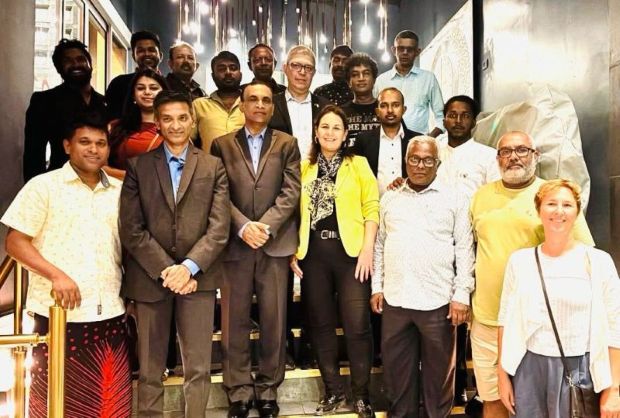Israel’s media tour and the questions Sri Lanka cannot avoid
A group of Sri Lankan journalists is currently in Israel on what is being described as a “study tour” aimed at giving foreign media and policymakers a clearer understanding of Israel’s current situation. At face value, such visits may appear harmless or even educational. Yet, the context in which this tour takes place, and the manner in which it has been organized, raise serious ethical and political questions that cannot be ignored.
The tour comes at a time when Israel’s ongoing war in Gaza has killed more than 270 journalists, according to press freedom watchdogs. Media rights groups across the globe have condemned Israel’s actions in Gaza as one of the deadliest assaults on journalists in modern history. At the same time, Israel stands accused at the International Court of Justice of committing genocide against Palestinians, a charge that has only gained more traction with each passing month of bombardment and blockade. Against this backdrop, the idea that journalists from Sri Lanka, or from anywhere, should participate in a state-sponsored media tour orchestrated by Israel is deeply troubling.
This is not merely a matter of optics. The involvement of the Sri Lankan Embassy in Tel Aviv, as well as the overtures made by Israeli diplomats from New Delhi, reveal that this is not a private initiative, as claimed by Media Minister Dr Nalinda Jayatissa. It is an exercise in state diplomacy and narrative management, designed to project a version of reality that obscures the violence unfolding in Gaza. To pretend otherwise is to deny the political character of such tours and the complicity they engender.
The Sri Lankan government, too, cannot wash its hands of this episode. At a time when Colombo has sought to project solidarity with the Palestinian cause in multilateral forums, its tacit approval, or at least its lack of objection, to this tour exposes a troubling contradiction. If Sri Lanka truly stands against genocide and for the protection of journalists, then it must reckon with the fact that endorsing or facilitating Israeli propaganda undermines that very stance. By allowing its embassy to play a role in enabling such visits, the government risks signalling to the international community that its commitment to Palestine is rhetorical rather than substantive.
At the heart of this controversy lies the responsibility of journalists themselves. The role of the media, particularly in a time of genocide and mass killing, is not to serve as an accessory to state propaganda but to uphold the principles of truth-telling, accountability, and solidarity with colleagues under fire. Accepting state-sponsored trips from a government actively accused of killing journalists and suppressing press freedom risks undermining that very responsibility.
Sri Lankan journalists, who have themselves experienced state violence and suppression in recent history, ought to exercise caution and moral clarity in such engagements, recognizing that credibility and independence are not only professional duties but also ethical obligations.
The ethical problem here is compounded by timing. Israel’s media offensive is not coincidental; it comes precisely when global opinion is shifting against it. The staggering civilian death toll in Gaza, the targeting of hospitals, schools and aid distribution centres, and the deliberate silencing of Palestinian journalists have made it increasingly difficult for Israel to maintain its narrative of self-defence. Study tours for foreign journalists are therefore part of a broader strategy: to court sympathetic coverage abroad and to soften the criticism directed at its policies. By participating, journalists risk becoming unwitting instruments of this agenda.
Moreover, the tour raises uncomfortable questions about the independence of Sri Lanka’s media institutions. In a country where journalists have long struggled against censorship, intimidation, and violence, accepting the hospitality of a government with one of the worst records on media freedom undermines the very struggle for press independence at home. It suggests a willingness to trade solidarity for access, and integrity for expediency.
It is also important to recognize that these visits take place in a context where Palestinian voices are systematically silenced. Foreign journalists are being shown a curated reality, carefully chosen sites, selective narratives, and official talking points, while the stories of Palestinians living under occupation and bombardment remain inaccessible. The task of responsible journalism, however, is to pierce through propaganda, not to be subsumed by it.
In the final analysis, this so-called study tour is not about understanding Israel’s “current situation”. It is about legitimizing Israel’s narrative at a time when the weight of international scrutiny is bearing down on it. For Sri Lanka, the participation of its journalists risks signalling a tacit endorsement of Israel’s policies. For the journalists themselves, it raises urgent questions about professional integrity and ethical responsibility. And for the government, it calls into question the sincerity of its stated commitment to Palestine and to press freedom.
Journalism is not a public relations exercise, and solidarity cannot be selective. To stand with Palestine means to stand against the silencing of Palestinian journalists, against the killing of media workers, and against attempts to manufacture consent for war through glossy tours. Anything less is not only hypocrisy but complicity.
-ENCL



Comments are closed, but trackbacks and pingbacks are open.